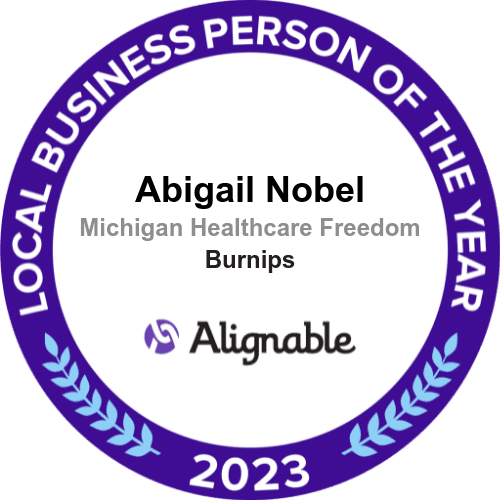
Michigan Advance posted a story yesterday afternoon based on interviews with two left wing Michigan doctors discussing the health care plans of the incoming Trump Administration.
Dr. Farhan Bhatti is the CEO of Lansing free clinic Carefree Medical and resigned from the Lansing Public School Board earlier this year. He took time out of his busy schedule in 2020 to testify to the U.S. Senate Judiciary Committee against the confirmation of Amy Coney Barrett to the Supreme Court. Dr Bhatti is a board member of the Committee to Protect Health Care, a super PAC that advocates for free public health care and the Affordable Care Act.
Dr. Rob Davidson, an ER doctor from Fremont, is the executive director of the Committee to Protect Health Care super PAC and a past U.S. Congressional candidate. He espouses gun control, abortion, mRNA vaccines, and government run health care.
It is doubtful that these doctors represent a majority of Michigan doctors, but the medical community has been radicalized since passage of the PPACA. Government now funds most of U.S. health care, from which doctors derive their incomes:
Michigan doctors prepare for expected GOP assault on Medicaid, Medicare and the Affordable Care Act
‘People like the ability to get affordable insurance. I think that will be a pretty big surprise for some people when they go to enroll’
By Jon King - December 10, 2024Michigan doctors say expected changes to Medicare and Medicaid, as well as the Affordable Care Act , will not only result in devastating health consequences for those least able to care for themselves, but likely higher costs for everyone down the road.
“People with mental illnesses that we’re treating every day, we’re keeping them stable. If they lose the access to the medications we’re prescribing them, they end up with worsening symptoms, worsening depression, and they end up either hospitalized or institutionalized in the prison system,” said Dr. Farhan Bhatti, the CEO of Carefree Medical. The Lansing-based nonprofit clinic provides medical, dental, optometry and behavioral health care to low-income, underinsured and uninsured adults and children.
Bhatti told Michigan Advance that the various proposals being discussed by Republicans in Congress during a second Donald Trump presidency are all being advanced as necessary cost-cutting measures despite the effect he says it will have to actually drive up health care costs.
“People who have diabetes and their blood sugar gets out of control because we were prescribing them insulin and they can’t get it anymore, they would end up with all the complications that diabetes can cause, which is blindness, kidney failure, increased risk of heart attack and stroke,” Bhatti said. He added that without insurance coverage those conditions will end up being treated in the emergency room instead of being prevented through treatment at clinics like Carefree Medical.
The biggest target for cost-cutting efforts is Medicaid, the government-run health care program that provides coverage to approximately 80 million adults and children with limited income and/or disabilities. Because it makes up about 10% of the federal budget, it has often been a target for GOP budget cutting.
The current iteration of these efforts – as laid out in the conservative Heritage Foundation’s Project 2025 report, the budget plan for fiscal year 2025 by the House Republicans’ conservative caucus, and the fiscal year 2025 House of Representatives budget resolution introduced in June – involves a combination of increasing eligibility requirements, decreasing federal reimbursement rates for states and trying to privatize some Medicaid services.
Whether through making it harder to obtain Medicaid benefits or simply providing fewer resources, Bhatti said, the downstream effect will be the same; a vicious downward spiral will be initiated.
“If they had a job, they’ll lose it because their physical health is deteriorating,” he said. “And then once they lose their job, they lose their income, maybe they get evicted from their home, and now they’re on the street, and now they’re trying to get on a list for Section 8 housing. I’ve seen all of this happen in my career and it’s only going to get multiplied and magnified if more and more people lose access to insurance.”
Also in the crosshairs are expected changes to the ACA, more commonly known as Obamacare.
Enhanced subsidies included in the Inflation Reduction Act, signed into law by President Joe Biden in 2022, allowed four in five users of HealthCare.gov in 2024 to obtain health care coverage for $10 or less per month. However, those subsidies are set to expire at the end of 2025 with little chance either Trump or GOP congressional leaders will extend them.
The Congressional Budget Office predicts enrollment in the ACA Marketplace will drop by nearly four million people in the year after subsidies end, from 22.8 million in 2025 to 18.9 million in 2026.
But an even bigger impact is the “massive reform” that House Speaker Mike Johnson (R-LA) has said is on the agenda for the new Congress, with GOP proposals that the Center on Budget and Policy Priorities says would result in raising people’s costs for health coverage, rolling back protections for people with pre-existing conditions, and increasing the number of people without coverage.
“Probably the biggest impact on folks in Michigan and certainly folks where I work would be getting rid of the expanded Medicaid provision under the Affordable Care Act,” said Dr. Rob Davidson, an ER doctor from West Michigan, and executive director of the Committee to Protect Health Care.
For Davidson the “most catastrophic potential outcome” would be a complete repeal of the Medicaid provisions of the ACA, which he said helps provide coverage for about a million Michiganders, up from approximately 800,000 when it was first introduced.
“It’s given a lot of individuals, a lot of families, very low premium insurance, with low copays, deductibles and all that, but at least having coverage for catastrophic issues or for the basic kind of primary health benefits, prescription drugs and primary care and preventative care,” he said. “That would go away as well. So that’s kind of like the catastrophic kind of event.”
While that seems to be the long-term goal, Davidson said in the short term, he expects a second Trump administration to decrease enrollment periods, as well as the funding for encouraging people to sign up. Either way, he expects far fewer people will end up with health insurance.
“We’re at the highest insured rate in this country’s history right now, I think more than 2 million more people [are] insured than there were under Trump pre-pandemic,” said Davidson. “Now with the pandemic, more people qualified for Medicaid, and that certainly increased during that crisis. But, I think that’s a very likely thing to happen.”
Davidson is frustrated by the disconnect many voters seem to have when it comes to the benefits of the ACA and the danger they have placed them in.
“I think people don’t quite get it. You know how the polling is, you say, ‘Obamacare, ACA’, ‘Oh, I don’t like it’ but then you put all the pieces of it that people benefit from, and people like that, right? People like the ability to get affordable insurance. I think that will be a pretty big surprise for some people when they go to enroll,” he said.
Davidson said that while there is a lot of pessimism about the future of the ACA, that doesn’t mean the fight to retain and even expand it is over.
“When the election was over in 2016, and they had control, they tried to repeal it and the [Committee to Protect Health Care] didn’t exist at that point in its current form. But other advocates came out vociferously and spoke out and went to their members of Congress’ offices and Senators’ offices and called in and staged protests and raised the alarm and made sure that those elected officials understood that these were important issues and that how they vote on them would have an impact “ he said, recalling that the results of that effort came to fruition when the late Sen. John McCain (R-AZ) memorably cast the deciding vote against an ACA repeal in 2017.
“What caused that to happen? Was it pressure? Was it just their internal kind of barometer of what is right? Hard to know for sure, but we’ll absolutely have to identify, particularly, those folks in the Senate and folks in House seats that are up every two years that are going to have to face the electorate,” he said. “Donald Trump or J.D. Vance or the administration, probably not going to change their mind. But I think appealing to those various elected officials in the House and Senate, that’s what you can do.”







